Quantum Cryptography
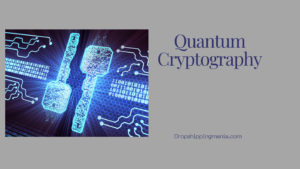
Quantum cryptography is a revolutionary form of cryptography that has the potential to revolutionize security and privacy. This type of cryptography involves exchan ging information in a way that cannot inter cepted or decryp ted by any third party. It uses the properties of quantum physics to create an unbreakable encryption system, ensuring that sensitive data remains secure. In this article, we will explore the science behind quantum cryptography, its applications in modern society. And how it can provide enhanced security measures for businesses. We will also take a look at some of Quantum Cryptography’s most impressive imple mentati ons as well as its future implications.
What is quantum cryptography?
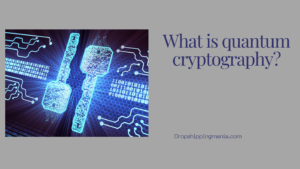
This is a type of cryptography that makes use of the principles of quantum mechanics to achieve a higher level of security than what is possible with classical crypto graphy. Quantum crypto graphy is still in its infancy. But it has the potential to be much more secure than traditional methods.
Is quantum cryptography used today?
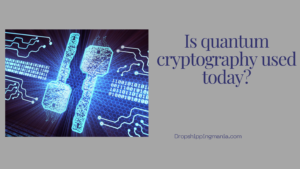
Yes, quantum cryptog raphy is use today. It is estimated that there are over 200 companies worldwide that are using quantum crypto graphy in some way. The most common application of quantum cryptography is in the form of Quantum Key Distribution (QKD). QKD is a type of quantum cryptography that uses single photons to encode a key between two parties. This key can then used to encrypt and decrypt information.
Is quantum cryptography Unbreakable?
Yes, This is unbreak able. Quantum crypto graphy uses the principles of quantum mechanics to encode and decode information. This makes it impossible for someone to eavesdrop on a quantum communication without detected.
Can quantum cryptography be hacked?
Quantum crypto graphy, also known as quantum key distribution, is a secure communication method that uses quantum mechanics to encode and decode data. The key is generated by a random number generator and then transmitted using a quantum channel, such as an optical fiber. The receiver decodes the key using a measurement device.
Quantum crypto graphy is considered to unbreak able because it is base on the laws of physics. However, there are some theoretical attacks that could potentially break the system. For example, a hacker could theoretically intercept the quantum channel and measure the state of the photons without disturbing them. This would allow the hacker to determine the key without detected.
Quantum crypto graphy is still in its early stages of development and has not widely implemented. However, it has great potential to become the most secure form of communication available.
Can quantum computing destroy Bitcoins?

Yes, quantum computing could destroy bitcoins. While traditional computers process information in bits. Which are either 1 or 0, quantum computers use qubits, which can be both 1 and 0 simultaneously. This makes them much faster and more powerful than traditional computers.
If a quantum computer were to used to attack the bitcoin network. It could easily break through the cryptographic algorithms that protect it. This would allow someone to counterfeit bitcoins or steal them from other users.
The good news is that the bitcoin community is aware of this risk and is working on ways to protect the network from quantum attacks. For now, however, quantum computing remains a potential threat to the security of bitcoins.
Why quantum computing is not a threat to Bitcoin?
Quantum computing is not a threat to Bitcoin for a number of reasons. First, quantum computers are not able to break the elliptic curve cryptography that is use in Bitcoin. Second, even if quantum computers were able to break elliptic curve cryptography. They would not be able to do so efficiently enough to attack the Bitcoin network. Finally, the Bitcoin network is constantly improving its security measures, which makes it even more resistant to quantum computing attacks.
Who invented quantum cryptography?
In the early 1970s, Stephen Wiesner invented quantum cryptography, which he described in a 1983 paper. Quantum cryptography is the science of exploiting quantum mechanical properties to perform cryptographic tasks. The basic idea is that if an eavesdropper tries to measure the quantum state of a system. They will necessarily disturb it, introducing errors into their measurements. This effect can used to detect eavesdropping and protect information.
What problems can quantum computers not solve?
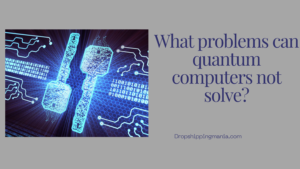
Quantum computers are not actually able to solve all problems. In fact, they can only solve certain types of problems that classical computers cannot. The main difference between quantum computers and classical computers is that quantum computers can store and process information using quantum bits, or qubits. Classical computers use bits that are either 1 or 0, but qubits can be both 1 and 0 simultaneously. This allows quantum computers to perform multiple calculations at the same time.
Can quantum computers crack 256 bit encryption?
It is widely believe that quantum computers would able to crack traditional encryption methods. In particular, it is often said that quantum computers could easily break today’s standard encrypt ion, which is base on the difficulty of factorizing large numbers. This is because the quantum computer can try all the possible solutions at the same time and find the right one very quickly.
However, there are a few things to keep in mind when considering whether quantum computers can break 256 bit encryption. First of all, while it is true that quantum computers can solve problems much faster than classical computers, they are not yet able to outperform classical computers for all problems. In particular, for factorization problems, there are efficient classical algorithms that are able to outperform the best known quantum algorithms.
Secondly, even if quantum computers were able to solve factorization problems faster than classical computers, this does not mean that they could immediately break all existing encryption schemes. Many of these schemes have designed specifically to resist attacks by fast factoring algorithms, and so they would likely still be secure against quantum factoring attacks.
Finally, it should noted that even if quantum computers eventually become powerful enough to break all existing encrypt ion schemes, this does not mean that we will no longer be able to communicate securely. We can always design new encrypt ion schemes that are secure against even the most powerful quantum computers.
Will quantum computers break the Internet?
As the world becomes increas ingly reliant on electronic communications, the security of these systems is of paramount importance. Quantum computers have the potential to break many of the public key algorithms that are use to secure electronic communications, including the RSA algorithm. This would allow an attacker to read encrypted messages and even forge digital signatures. While quantum computers are not currently powerful enough to break these algorithms. They are rapidly becoming more powerful and it is only a matter of time before they are able to break them.
Is quantum cryptography the future?
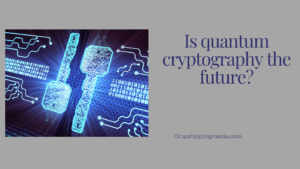
Quantum cryptography is an emerging field of quantum information science that could potentially revolutionize the way we secure information. While the principle of quantum cryptography has known for decades, it is only recently that the technology has begun to catch up with the theory. If successful, quantum cryptography could provide an absolutely secure way to transmit information. Making it impossible for eavesdroppers to intercept and read messages without detected.
The first successful demonstration of quantum cryptography was performed in 1989 by Charles Bennett and Gilles Brassard, who used a technique known as quantum key distribution (QKD) to exchange a secret key between two parties without revealing anything about the key to an eavesdropper. Since then, there have been many other QKD experiments, and the technology is now beginning to move out of the laboratory and into the real world. In 2012, Swiss scientists used a QKD system to exchange keys over a 144 km fiber optic cable, setting a new record for distance.
There are still some challenges to overcome before quantum cryptography can widely deployed. But many believe that it is only a matter of time until it becomes commercially viable. Some experts predict that quantum cryptography could become common within 10-15 years, while others believe it will take longer. However long it takes, there is no doubt that quantum cryptography represents the future of information security.
Is quantum cryptography expensive?
Yes, quantum cryptography is expensive. The equipment required to This is very costly and the process of setting it up can complicated. However, the benefits of quantum cryptography may outweigh the costs for organizations that need to protect their data from very sophisticated attacks.
Why is quantum cryptography resistant to eavesdropping?
Quantum cryptography is resistant to eaves dropping because it relies on the laws of quantum mechanics. Quantum mechanics is the branch of physics that governs the behavior of matter and energy at the atomic and subatomic levels. One of the key principles of quantum mechanics is the Heisenberg uncertainty principle. Which states that certain properties of particles (such as momentum) cannot known with absolute certainty. This principle makes it impossible for an eavesdropper to intercept and measure a quantum signal without introducing errors that can detected by the legitimate receiver.
Who uses quantum encryption?
Quantum encryption is use by anyone who wants to keep their information secure. This includes governments, businesses, and individuals. Quantum encryption is the most secure form of encryp tion available, and it is impossible to hack.
How safe is quantum cryptography?
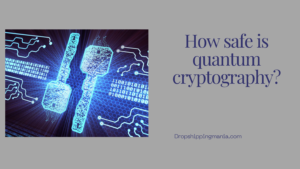
Quantum cryptography is a field of quantum information science that studies the application of quantum mechanical effects to cryptographic tasks. It is typically use to refer to the use of quantum mech anical effects. Such as quantum entanglement or quantum tunneling. To perform cryptographic tasks that are otherwise impossible or difficult with classical methods.
There are a number of different ways to implement quantum cryptography, but all have the same basic goal: to create a communication system that is secure against eaves dropping. One popular method is called Quantum Key Distribution (QKD). Which uses the principles of quantum mechanics to exchange a secret key between two parties. QKD can used to create an un condit ionally secure link. Meaning that the security of the system does not rely on any un proven assumptions about the computational power of an attacker.
another common method is called Quantum Cryptography with Noisy Channels(QCNC). Which takes advantage of the fact that measurement noise in a quantum channel can introduce errors in any attempt by an eaves dropper to read the data. This makes it possible to detect and correct for eaves dropping. Without needing any assump tion about the attacker’s computational power.
The security of QCNC schemes has proven under very general assump tions, including when the channel noise is arbitrarily large. This means that QCNC can used to create a communication system that is secure against even powerful attackers. Such as those with access to unlimited comput ational resources.
Quantum cryptography is thus a very promising technology.
For more interesting article visit given link:


